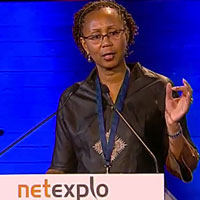A Taste of the Davos Buffet…
Afroes Founder and Schwab Social Entrepreneur 2013, Anne Githuku Shongwe, travelled to Davos for the World Economic Forum as part of the Social Entrepreneur finalists. Here are some of her thoughts from the conference:
A taste of the Davos Buffet
This was my first opportunity to visit Davos - the home to the annual WEF where global business, governments, philanthropists and the various exciting New Champions communities of the WEF: Social Entrepreneurs, Young Global Leaders and Global Shapers, Technology Pioneers gather.
So what were the different flavours at the Davos table? It was truly refreshing to see that, though very poorly represented here, the Africans are at the global table of big business and global governance and the world recognizes - finally – that we are relevant. Mind you, we could do ourselves a big favour and arrive in numbers from every corner and come prepared to claim our stake at this table as equal and powerful members of the global family.
Like the Nigerians! What a show of confidence and economic possibility. They came in full force led by President Goodluck Jonathan and Africa’s no 1 billionaire Aliku Dangote. They shared their story, their plans, they fed us all and coloured the otherwise mostly grey WEF with green and white scarves everywhere and they flew in a fantastic band to woo us all and they sang ‘ …I am an alien, I am a Nigerian in Davos.’ Wow! Watch this space.
The South Africans were also there - the biggest flag in town over the Kirchner Museum and many, many were engaged in key discussions. The economists may be suggesting that the BRICS star is fading and it is time for the MINT (Mexico, Indonesia, Nigeria and Turkey) but whatever the outlook they are here in full force led by the most competent and articulate Minister of Finance Pravin Gordhan, other Ministers, the Mayor of the City of Johannesburg who was quoted severally for his contribution at the International Business Council. And proudly South African business and in particular women business leaders - from the CEO of Anglo American mining house - the only female mining Chief in town - to the Chair of the Industrial Development Corporation, Madame Phumzile Mlambo-Ngcuka, former Deputy President and now Under-Secretary General and Executive Director of UNWOMEN is here too. Go Sisters!
President Ellen Johnson-Sirlief of Liberia, President Kagame of Rwanda and President John Mahama of Ghana were all truly eloquent in their addresses and demonstrate strong leadership in Africa. But where was Kenya? And Senegal? And all the other rising stars?
That said, I am truly disappointed at the glaring absence of women in most of the significant conversations taking place at the WEF! Sure there have been some great women speaking here and there but certainly hardly enough! Many men and women are here with their spouses but alas, all I see is a dominance of a sea of grey and black suits! I can only wonder if this is a sign that Women Leaders are shrinking in their numbers in Business and Government around the world? The WEF reports a drop in women’s participation to 15% from 17% last year.
It’s not all bad news though. I attended a great conversation ‘Women Empowering Women’ that had both business leaders like Sheryl Sandberg COO of Facebook and Founder of the Lean In Foundation, political leaders from South Korea, Mexico, Botswana and Norway and all of us. It was somewhat an insider’s story and strategy conversation, so I can’t share too much but suffice to say that women at the table committed themselves to leveraging one another and the other 51% women of the world to claim equal participation at the WEF from 2015.
So here are the issues that resonated with me and for which I draw hope for the future. The theme of this WEF 2014 was The Reshaping of the World: Consequences for Society, Politics and Business.
On the very first day, as I attended plenaries, IdeasLabs and side meetings, I was pleasantly surprised to hear leaders lament about how inequality and unemployment, in particular youth unemployment is the greatest challenge of our time. Not to oversimply the issue, but for the first time I recognized the significant impact of the Arab Spring on the world. In the globalized world that we have become, no one wants another fateful and expensive uprising upsetting the economic cart for something that we can collectively do something about - like create jobs and livelihoods!
The coolest thing about the WEF are the New Champions Communities but in particular the youth communities - Young Global Leaders and Global Shapers. We learned that the International Business Council - a group of the most powerful business communities from across the world (with shinier badges then the rest of us) invited some of these youth to have a serious chat about youth unemployment. I am told that the Youth did come to the party and put their experiences and innovative ideas on the table for business to consider and urged them to do so quickly. It remains to see how serious business and governments are on this issue. But yet other communities had serious conversations about youth unemployment. I attended a conversation where Microsoft who have already invested significantly on this issue through their YouthSparks programme and the Rockerfeller Foundation who invest across Africa on Digital Jobs pulled together social entrepreneurs, business and NGOs to explore how to strengthen this work even more and reach many many more youth in innovative ways.
The other big ticket conversation was about investing heavily on entrepreneurship as a clear alternative to jobs. Big business like Coke shared their initiative 5 by 20 Initiative (5 millon women by 2020) to ignite entrepreneurship amongst women along their supply chain, Goldman-Sachs their 10,000 women entrepreneurship initiative and numerous others including governments.
I left Davos with the honest belief that a Jobs and Enterprise Compact compelling every single business in the world to commit significant resources - as you would Corporate Social Responsibility - to enabling jobs, enterprise and skills development is a no-brainer investment because the alternative - more Arab Springs everywhere - is unthinkable and preventable.
The other big and related conversation was on Education and Skills 2.0: New Targets and Innovative Approaches as a report released at Davos this week is called. As a start there was a strong criticism of the MDG 2015 goal of education focusing only on primary education. While many countries have seen some improvement in primary school enrollment and completion, the greatest gaps are in the secondary level that is required to prepare youth for jobs and enterprise. There were several key conversations about the importance of investing in girls and women for all the reasons that are incapsulated in the famous quote “Educate a man and you educate one person; educate a woman and you educate a whole nation.” Again this is a no brainer that all governments, business and philanthropists must heed. Former Prime Minister of the UK Gordon Brown is a passionate leader on this issue and led several conversations about initiatives around the world including in Malawi and Pakistan that are already showing great promise
And then there was a most exciting conversation around innovation and the use of technology in education and skills development. The MOOCs (Massive Open Online Courses) led by Coursera, Edx and Udacity were there in full force participating in conversations alongside Universities and discussing how blended learning is becoming the norm in the US. A few of us social entrepreneurs are working in this space in African countries and in Mexico.
Now I find this conversation quite fascinating for two reasons. The first is that entrepreneurs and innovators have disrupted the University learning norm and forced a new standard and way of learning giving students more control and input into their own learning. Watch this space for more disruption. The second is that the conversations at the WEFs on blended learning et all are very focused on the US and a little in Europe excluding the contexts elsewhere. For Africa where less than 15% of students ever go to Tertiary institutions of any kind, the question is not so much should learning be blended. But rather can mobile and online learning revolutionize skills development and education by extending it to potential students who would otherwise not stand a chance to go to a physical institution for myriad of reasons. Khan Academy is already blazing the trail in this area with online courses available for free on all kinds of important skills and curricula. Innovators in this space have the opportunity to significantly impact on this space and close that inequality gap that is driven significantly by access or not to education and skills.
And there was so much more that was really inspiring at the WEF. The President of Mongolia shared his radical approach to stem corruption in government, business and society and I believe he needs to become a roving Ambassador to persuade his peers to do the same.
And what fun to bump into Matt Damon, Eric Schmidt of Google or Bill Gates or The Queen of Belgium and simply stop to have a chat because we all had an - almost - equal place at the table.
For those of us coming from the warmer south, I so get why the meetings are held in that beautiful, picturesque but oh so so cold skiing resort town of Davos. Now how else would you get us all to sit through 4 very full days of conversation after conversation knowing full well that we won’t sneak out to bask in the sun or go shopping. The cold and falling snow outside made sure that we all walked briskly to and from the Congress Centre determined to keep our bodies and brains warm with all that great and passionate sharing and exchange of ideas. Nice!
Click here to watch Anne’s video from Davos
 Afroes presents panel and demoes at Games for Change
Afroes presents panel and demoes at Games for Change Afroes wins Netexplo Award
Afroes wins Netexplo Award